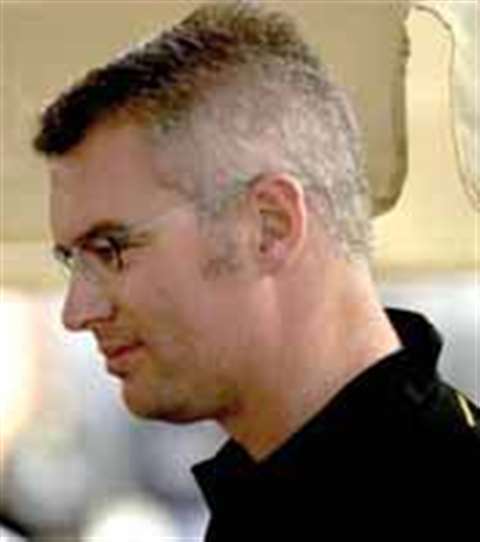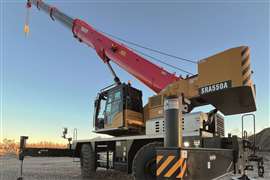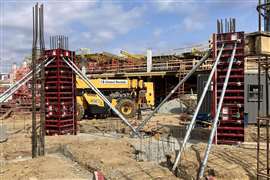Taking safety worldwide
07 May 2008

“Be careful.” how many times have you said it, or had it said to you? Does that simple warning prevent you from doing something reckless? Or do you become slightly irritated and mutter something about knowing what you are doing? Isn't taking care just a matter of common sense? After all nobody wants to be horribly injured or die.
Well, you'd think so, but working at height is still the cause of numerous preventable accidents and deaths every year and reducing that number is a challenge that IPAF (International Powered Access Federation) has set itself.
In this, the year of its 25th anniversary, IPAF is really driving home the message set out in its “Click It!” campaign with a series of powerful demonstrations at major construction shows around the world. “Click it!” promotes the correct use of a harness while operating a boom-type aerial work platform.
The demonstration features a mannequin, which is the weight of a man, travelling in the basket of a slightly elevated boom. When the MEWP moves slowly over two small bumps the mannequin is thrown around the basket like a rag-doll. The basket has been specially modified with a restraining cage to prevent the dummy from flying out, but it is clear that in reality, the operator would be flung from the platform.
The “Click it!” initiative highlights one element of safe operator practice and promotes the importance of training. Key to preventing accidents is ensuring that users of powered access equipment are properly trained in its use. With 70000 PAL (Powered Access License) cards issued last year and with training centres in 21 countries IPAF's PAL card scheme must be counted a success.
Regional differences
Yet deaths from falling are still too high and preventable. One reason is that IPAF's message is received with different levels of enthusiasm in different geographical regions. IPAF's international training manager, Rupert Douglas-Jones, suggests that success is more about winning hearts and minds than adopting a proscriptive, hectoring attitude. IPAF must consider national characteristics, differing legislation and working practices while maintaining the quality of training to ensure that the PAL card has the same value all over the world.
IPAF's roots in the UK have naturally given rise to it being furthest forward with the acceptance of PAL Cards, but a number of countries in Europe are quickly coming on line. “The UK has an advanced, almost stringent approach to training,” says Mr Douglas-Jones, “Germany approaches training in a similar way and Italy is very enthusiastic and growing quickly – at the same rate that the UK was five years ago. Spain is also impressive.”
The training ethos in France is high too but, with a very well established, government run, national scheme, CACES (Certificat d'aptitude a la Conduite), in place IPAF has a difficult challenge in raising the profile of the PAL Card scheme (see box).
Maltech, a Swiss access rental company with 18 outlets, was the first IPAF certified training centre in Switzerland. Ulrich Hunziker, a director of Maltech, says that, although there is no direct legislation relating to training, users of powered access equipment accept the importance of training and understand its necessity. Mr Hunziker says that Maltech has trained over 500 people. “When we started it was just one training course a month. It only took three or four months for interest to grow and now we do two training courses a week.”
The spread of the IPAF training message from the UK across Western Europe is an important achievement. But a cynic might suggest these are the soft targets: members of the European Union used to the encroachment of health and safety legislation, but can IPAF extend its influence into other areas?
According to Rupert Douglas Jones, Eastern Europe is an exciting developing market and IPAF already has training centres in Slovenia and the Czech Republic. “Eastern Europe has very high standards of engineering skills,” he says. The PAL Card scheme is being introduced to many Eastern European migrant workers in the UK where teams of people are being brought in for training. Some UK training centres, such as those at UK rental companies Facelift and Rapid Platforms, are offering a verbal translational into Polish during training.
Persuasion
Convincing North American users that they need a PAL Card system is not easy. Manufacturers tend to have their own training courses taking as little as half an hour.
The main drive for PAL card adoption comes from the major manufacturers who are members of IPAF. US operators prefer ownership of their schemes, and IPAF's North American subsidiary, AWPT (Aerial Work Platform Training), devises courses to suit the market. These are currently slightly different from IPAF courses but, in time, the two will come into line.
Brad Boehler, director of safety at Canadian manufacturer Skyjack and a member of the IPAF executive safety council, admits that convincing the North American market of the importance of a worldwide, standardised training method is complex. He is prepared to approach the problem from every angle in order to make progress (see box on page 31).
Where North America might be resistant, Rupert Douglas-Jones believes that demand from the Middle East will come suddenly and in a rush. The speed and scale of building in the Middle East are huge: they are building the equivalent of London every seven years.
Some foreign contractors, working in the Middle East, are already familiar with IPAF and the PAL card programme. It is accepted, and even demanded, on some sites, but usually of European workers. Another driving force is the local perception that accidents might reflect badly on the prestige of these high profile projects and training suddenly become paramount.
Mr Douglas-Jones hints that IPAF has plans in place to address this market, but that the organisation must be confident of adequate local resources.
Eastern promise
In the Far East is the kernel of a success story for IPAF: two training centres have been established in Singapore. Raymond Wat, product manager at BS Technology Pte says, “Since we launched our IPAF approved training centre at the Asia, Pacific Occupational Safety and Health show in 2007 we have caught the attention of the Singapore MOM (Ministry of Manpower), who we are talking with to promote a better training system in the region.”
Training in this region is mostly provided by rental companies and is generally of just 30 to 60 minutes duration. Mr Wat is confident that, with support from IPAF and the MOM, BS Technology's education and marketing programme will soon improve awareness.
The BS Technology facility carried out its first training course on 8 January this year and has now trained 19 people with 30 more scheduled to attend, among the trainees were three people from Batam, Indonesia, who made the journey to BS Technology specifically for IPAF training.
In developing regions such as India and China IPAF training, as it stands at the moment, it is still too expensive when set against the cost of employees. IPAF is looking into alternative ways of introducing training and safety awareness to these markets.
In five years time Mr Douglas-Jones expects all the mainland western European countries to be on a par with the UK and as the established base spreads it will have a knock-on effect into other areas.
IPAF is not resting on its laurels, after 25 years it is difficult to say how many injuries and deaths its training programmes have prevented but the organization seems determined to spread the safety ethos worldwide, employing a range of tactics and techniques and putting muscle behind the message “Be careful.”






